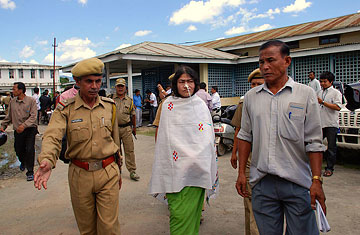
Irom Sharmila, who has been on an 11-year hunger strike protesting an Indian anti-terror law, leaves a court hearing in Imphal, India, on August 30, 2011
When Indian activist Anna Hazare went on a 12-day hunger strike last month to protest government corruption, he became an instant celebrity across the country. India's television networks devoted countless hours of coverage to the fast and hundreds of thousands of people took to the streets in support of Hazare, who was trying to push Parliament to adopt legislation creating an independent anti-corruption agency. In the end, lawmakers capitulated and agreed to adopt a number of his provisions — and Hazare ended his public campaign.
In a remote region across the country, another activist has been quietly waging her own hunger strike — without fanfare or media attention — for the last 11 years. Irom Sharmila has been fasting in Manipur, a small state of 2.5 million people in the far northeastern arm of India, to try to force the government to repeal a controversial law called the Armed Forces Special Powers Act (AFSPA), which gives the Indian army and paramilitary forces sweeping powers to arrest people without warrants and use deadly force against suspects without fear of prosecution. So why has Sharmila's fast — undoubtedly the longest-running in the world — gone virtually unnoticed, while Hazare's much-shorter protest captivated the nation?
Analysts say the main reason is that Sharmila's cause remains a largely regional issue owing to the specialized nature of the 53-year-old law. Babloo Loitongbam, a Manipur-based human rights activist and close associate of Sharmila's, says the act only really affects people living in areas with frequent disturbances like the insurgency-wracked northeast, which has historically been opposed to the central government and long advocated for secession. "Whatever comes out of these areas comes filtered through the lens of national security," he says. "There seems to be a feeling among the middle class and the patriotic Indian that doing away with the act would be giving [in] to the secessionist calls from these areas."
Northeastern India, made up of seven states virtually surrounded by Bhutan, Bangladesh, China and Myanmar, is one of the most neglected and underdeveloped regions in the country. There are a massive number of security forces in the region engaged in counter-insurgency operations — Manipur state alone has 12 active insurgencies. Sharmila, a 39-year-old poet, began her hunger strike in November 2000 after security forces allegedly shot and killed 10 people, including teenagers, following an explosion on a road outside a village in Manipur. The soldiers later claimed they acted in self-defense, but a judicial inquiry found no evidence to support this.
Because the media hasn't devoted much attention to Sharmila, who is being force-fed through a plastic tube in her nose in a Manipur hospital, images of her thin frame and gaunt face don't regularly reach the public. This has allowed the central government to continue to look the other way, too, Loitongbam says. "Manipur is disconnected from mainland India. No one really bothers about what happens there," says Sreeradha Datta, director of the Kolkata-based Maulana Abul Kalam Azad Institute of Asian Studies and an expert in northeastern Indian affairs. "Sharmila's fast has never been a priority for them [the government]."
That might be about to change. Seeking to capitalize on Hazare's publicity, Sharmila made an emotional appeal to her fellow hunger striker last month to take up her cause, as well. Although Hazare's aide has declined on his behalf, citing fears it would dilute Hazare's anti-corruption agenda, Sharmila's request brought new media attention to her strike and raised questions about the government's continued apathy towards her case. In an interview with the Indian television channel CNN-IBN this month, she was asked what she would like to say to Prime Minister Manmohan Singh, if given the chance. She replied: "First, I would like to request him to just look at me like Anna Hazare."
Faced with the prospect of a popular backlash over Sharmila's protest for the first time, some top officials appear interested in finding a solution that would allow her to break her fast. At the beginning of September, Home Minister P. Chidambaram said his ministry was "trying its best to revisit AFSPA. But one needs to build consensus." Federal Law Minister Salman Khurshid also met with Sharmila's supporters last week to discuss a possible end to the stalemate. (The Defense Ministry and the armed forces, meanwhile, have resolutely opposed any amendment to the act).
While Hazare's movement has breathed new life into Sharmila's struggle, it remains to be seen whether she'll attract the same groundswell of support among everyday Indians. Her backers are now planning a massive rally in Delhi on Oct. 2, Mahatma Gandhi's birth date. If support for Sharmila does indeed reach a fever pitch in the country, the government will no doubt have to revisit the recommendations of a review committee headed by a retired Supreme Court judge, which issued a report in 2005 calling on the government to repeal AFSPA and incorporate key provisions of the act into a law that applies to the whole country, not just the northeastern states. "The complaint of discrimination would then no longer be valid," the report said.
The reason the Indian government hasn't taken this step is because Sharmila hasn't been considered a real political threat. At least not yet.
